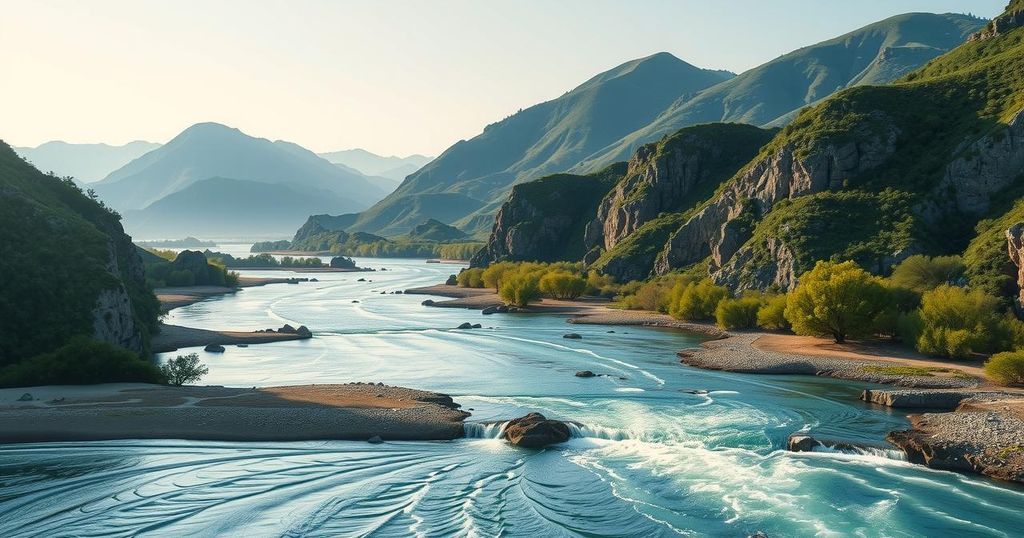The Democratic Republic of Congo is engulfed in a crisis as M23 rebels capture territories, drawing in neighboring countries like Rwanda, Burundi, and Uganda. President Félix Tshisekedi seeks to regain lost ground while accusing Rwanda of support for the rebels. Meanwhile, regional dynamics complicate the conflict, with each country pursuing its strategic interests against a backdrop of humanitarian turmoil and the struggle for control over rich resources.
The ongoing crisis in the Democratic Republic of Congo (DR Congo) is marked by the M23 rebels seizing significant territory in the mineral-rich eastern region, leading to a humanitarian and diplomatic emergency involving neighboring countries. An array of African nations has already deployed troops to the conflict zone, which has a history steeped in external interference. The DR Congo, occupying a vast area, has representation in both East and Southern African regional blocs, which are convening an emergency summit to address the ongoing violence.
President Félix Tshisekedi of the DR Congo aims to reclaim territory under rebel control, particularly the key town of Goma. He has accused Rwandan President Paul Kagame of supporting the M23 with military resources, alleging an invasion aimed at exploiting the country’s mineral wealth and instigating regime change. Despite UN reports corroborating his claims, international responses have yet to deliver tangible consequences for Rwanda, leaving Tshisekedi concerned about his political future amidst potential threats from internal opposition and a fractious military.
Rwanda’s President Kagame, while at the center of the controversy, adeptly deflects blame by focusing on defending Rwanda from perceived threats, particularly from Hutu militants who fled into DR Congo post-genocide. Though Rwanda denies involvement with the M23, it insists on engaging directly with the armed group while seeking recognition of its narrative that the conflict represents a Congolese issue. The country’s interests span security and economic dimensions, particularly related to access to DR Congo’s resource-rich eastern territories.
Burundi, sharing borders with Rwanda and DR Congo, has deployed troops to combat Burundian rebel factions but now finds itself supporting Kinshasa against the M23. The relationship between Burundi and Rwanda is fraught with tension, and Burundi’s President Ndayishimiye has issued stern warnings regarding Rwanda’s military maneuvers, highlighting fears of escalating conflict. The Burundian government perceives the M23’s advance as a direct threat to its regime’s stability, necessitating action to preempt a potential spillover of violence.
Uganda operates in a complex role, positioning troops in eastern DR Congo to address security issues linked to militants associated with the Islamic State group. However, conflicting reports suggest that Uganda may also provide tacit support to the M23. While Uganda aims to bolster its influence in the region, past accusations of exploiting DR Congo’s resources add a layer of scrutiny to its involvement in the current crisis.
South Africa has notably contributed troops as part of a regional force allied with the Congolese government but is embroiled in a diplomatic spat with Rwanda. South African President Ramaphosa has publicly condemned Rwandan forces following casualties suffered by his troops, thereby escalating tensions between the two countries. This situation reflects a broader division among African nations, with members of the East African Community advocating for negotiations with the M23, while the Southern African Development Community remains firm in its support for DR Congo’s sovereignty.
The crisis in the Democratic Republic of Congo involves the resurgence of the M23 rebels, whose military actions have reignited a complex web of regional conflicts. Historically, the eastern DR Congo has been a hotbed for power struggles, driven by the region’s rich mineral resources and the involvement of various neighboring countries. The local population has endured significant humanitarian challenges as external forces vie for influence. As a result, diplomatic efforts have intensified to restore stability.
This intricate crisis underscores the complex interplay of regional power dynamics in the DR Congo. The roles of neighboring nations—Rwanda, Burundi, Uganda, and South Africa—highlight the multifaceted nature of the conflict as each country pursues its interests amid a backdrop of humanitarian distress. Continued international attention and decisive actions are imperative to navigate the turbulent landscape and seek sustainable resolutions to the ongoing crisis.
Original Source: www.bbc.co.uk
